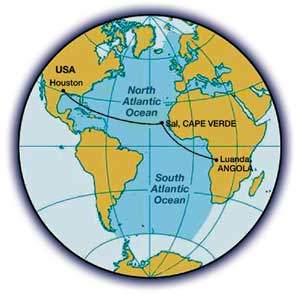International
While U.S. is on hold, other countries make E&P decisionsIn contrast to the U.S., where residents sat in disbelief waiting for the state of Florida to determine their next president and energy policy, the rest of the world continued to shape upstream policies, programs and projects. A prime example is OPEC’s decision at its meeting last month to not increase oil production further. The group argues, probably correctly, that speculation, high fuel taxes and refining bottlenecks are responsible for driving up oil prices and keeping them high. OPEC noted that it has pumped an extra 3.7 million bopd this year. During their meeting, oil ministers selected Venezuela’s Ali Rodriguez as OPEC’s next secretary-general. On January 1, he will succeed Nigeria’s Rilwanu Lukman, who retires after a five-year term. Succeeding Rodriguez as OPEC president will be Algerian Oil Minister Chakib Khelil. He will alternate in the post every six months with Nigeria’s minister. Venezuelan gas program progresses. State-run PDVSA Gas qualified 11 companies last month to present bids for the non-associated, natural gas licensing round, slated for first-quarter 2001. The firms include ENI, ExxonMobil, Inelectra (Venezuelan firm), Mitsui, Phillips Petroleum, Suelpetrol (Venezuelan firm), Tecnoconsult, Tecpetrol (Argentine company), Teikoku Oil, TotalFinaElf and Vepica (Venezuelan firm). Other interested companies had until the end of last month to register. Firms are classified as Class A (constituted in Venezuela, with a minimum of 51% Venezuelan capital and directed by Venezuelan nationals) or Class B (foreign firm or domestic company employing less than 51% Venezuelan capital). The consortium that wins Yucal-Placer Block – the only tract in the round with proven reserves – must be at least 70% formed by Class A companies. Eleven blocks will be tendered – one in Zulia state (197 sq mi, estimated reserves of 2 to 6 Bcfg); one in Barinas, Portuguesa and Trujillo states (761 sq mi, estimates reserves of 2 to 6 Bcfg); and nine areas in Guarico, Cojedes and Aragua states (seven tracts with reserves of 2 to 8 Bcfg, and two areas in Yucal-Placer Block with proven reserves of 2 Bcf ). Peru defers oil round. State firm Perupetro told Business News Americas that it has deferred its next, 16-block, oil licensing round until next year. The round had been set for this month. Additionally, the offering will be broken into two rounds – one in first-half 2001 and one in second-half 2001. No revised dates for the rounds had been set at press time. Perupetro had planned to tender 13 offshore and three onshore blocks in this year’s single round, following award of a transport / distribution phase of the giant Camisea natural gas project. However, political turmoil in the country and delays at Camisea prompted the delay. When the rounds do begin, only the 13 offshore tracts will be split among them. Perupetro said that it is negotiating directly with oil companies for two of the three onshore blocks. New consortium formed in Sudan. As reported in local newspaper, As-Sahafi Ad-Dawli, Chinese National Petroleum Corp. (CNPC), Gulf Oil of Qatar, an unnamed United Arab Emirates firm and state-run Sudapet have formed a joint venture to explore southeastern Sudan. The JV will explore a 30-sq-mi concession east of the White Nile River, in the eastern portion of Upper Nile state. In addition to exploration, existing oil fields in Adaryel will be developed. Gulf Oil will hold 46% of the JV, while CNPC and the UAE firm hold 23%, each. The remaining will 8% will go to Sudapet. Angola’s "one-by-one" plan surprises TotalFinaElf. According to local reports confirmed by Reuters, Angola’s Petroleum Ministry intends to change its oil field development policy. Petroleum Minister Jose Maria Boleho de Vasconcelos was quoted as saying that future, billion-dollar field developments will be approved "one by one" rather than simultaneously. Vasconcelos said the purpose is to prolong the life of offshore oil reserves that "should not be developed so they get exhausted as fast as possible." At least one operator, TotalFinaElf, was caught off-guard by the news. "Total has not been informed of any policy change by its partner, (state-run) Sonangol, said a spokesman. He noted that the firm’s Girassol oil field development, along with plans for output at Dalia field, remained on track.
Houston-to-Luanda route inaugurated. Thanks
to growing E&P activity, Houston is now officially a gateway to Africa. Using a wet-leased World Airways
MD-11, Sonair Servico Aereo (a subsidiary of Angolan state oil firm Sonangol) inaugurated air service on
November 6th between Houston and Luanda, Angola, with a fuel stop at Sal, Cape Verde Islands. World Airways
flies passengers and freight twice weekly, departing Houston on Mondays and Wednesdays, and arriving in Luanda
16 hr later. Return flights leave Luanda on Tuesday and Thursday evenings. Bookings on these flights, known as
"The Houston Express," are restricted to personnel of member-companies of the U.S.-Angola Chamber of
Commerce that join with Sonangol in a private air charter association. Principally, these members are oil
companies and equipment / service firms. For more information on flights, contact the chamber in Washington,
D.C. (phone: 202 223 0540, fax: 202 223 0551, e-mail: 75031.3361@compuserve.com).
|
- Applying ultra-deep LWD resistivity technology successfully in a SAGD operation (May 2019)
- Adoption of wireless intelligent completions advances (May 2019)
- Majors double down as takeaway crunch eases (April 2019)
- What’s new in well logging and formation evaluation (April 2019)
- Qualification of a 20,000-psi subsea BOP: A collaborative approach (February 2019)
- ConocoPhillips’ Greg Leveille sees rapid trajectory of technical advancement continuing (February 2019)




